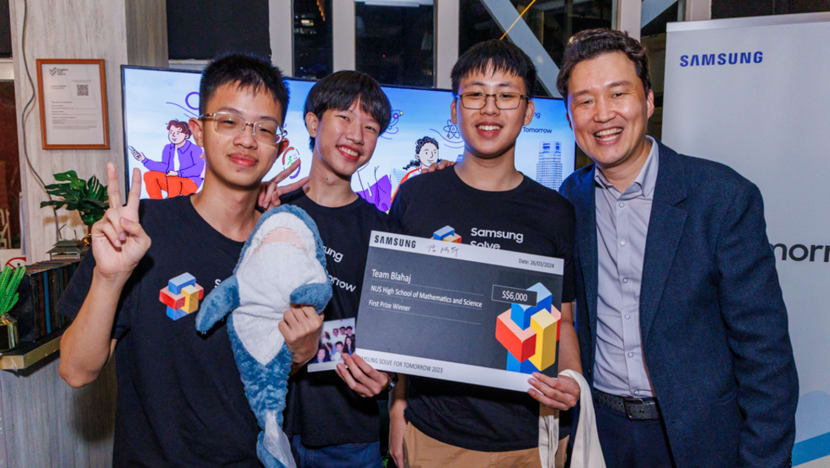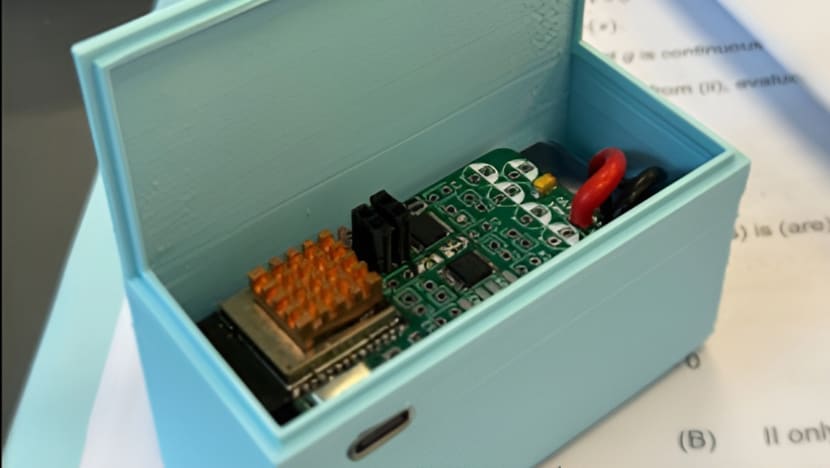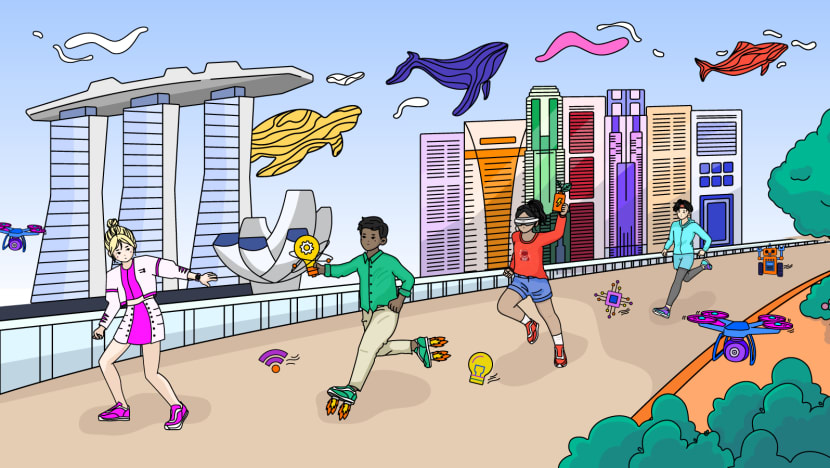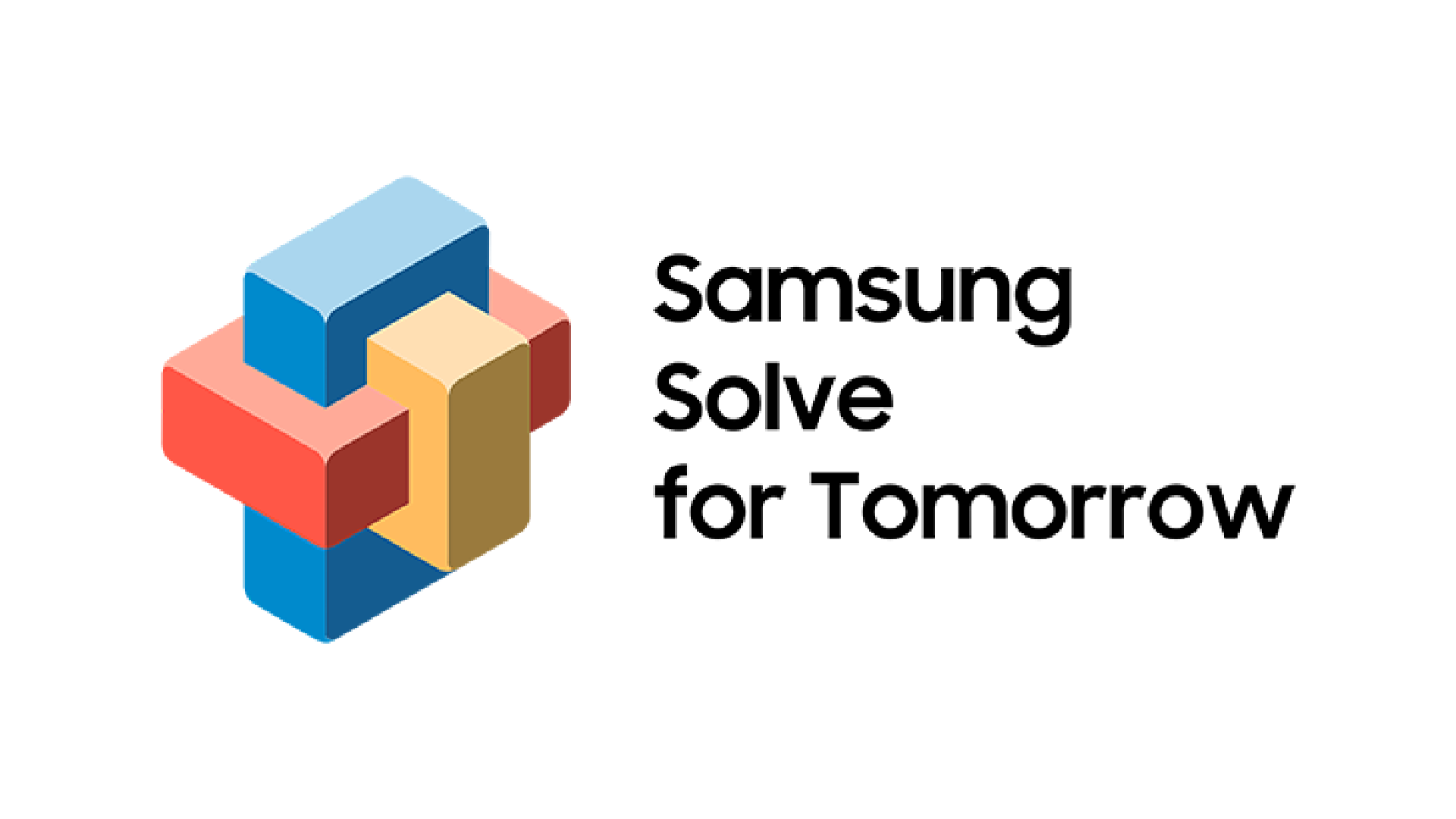Tech for good: Young innovators map a safer path for people with visual impairments
Samsung Electronics Singapore’s Solve for Tomorrow empowers secondary school students to enact meaningful change through trailblazing solutions.

Winners of the Solve for Tomorrow 2023 competition, Team Blahaj from NUS High School of Mathematics and Science, with Mr Dennis Jang, managing director of Samsung Electronics Singapore. Photos: Samsung

This audio is generated by an AI tool.
Smartphones have become an integral part of helping us navigate the world, be it exploring tourist attractions on holiday or figuring out the most efficient way to get to work.
A team of NUS High School of Mathematics and Science students is taking navigation technology one step further, envisioning a world where smartphones equipped with cutting-edge software can offer visually impaired individuals a detailed understanding of their physical environment and the obstacles that might lie in their path.
Their invention, a two-part solution that leverages advanced technologies like artificial intelligence (AI) and light detection and ranging (LiDAR), was crowned winner of Solve for Tomorrow 2023.
The annual competition by Samsung encourages secondary school students in Singapore to identify social issues and use their skills in critical and design thinking, communication, and science, technology, engineering and mathematics (STEM) to devise solutions. By equipping students with the essential experience and mindset to unlock the potential of technology, Solve for Tomorrow serves as a platform for young innovators to explore their passions and nurture a sense of social responsibility.
Wang Zerui, the 17-year-old leader of 2023 winner Team Blahaj, said Solve for Tomorrow stood out not only for its advocacy of technological creativity, but also for its emphasis on actualising solutions that could make a difference to the community. “It was this dynamic blend of innovation and societal impact that resonated with me,” he shared.
Entries are judged based on their relevance, feasibility, creativity and use of technology. The top three teams win Samsung products worth up to S$22,000 as well as cash prizes.
Solve for Tomorrow returns this year with five themes to inspire students: Health; sports and wellness; environmental sustainability; learning and education; inclusive, harmonious society; and Singapore’s digital future.
POWERING SOCIETAL IMPACT WITH TECH INNOVATION
Team Blahaj’s members – which include Zerui’s schoolmates Vincent Kwok, Christian Tan and David Chik – were motivated by their desire to enhance the quality of life of visually impaired individuals within their families and the broader community.
The team’s solution relies on LiDAR and AI-powered object detection in smartphones to build a real-time map of obstacles in the environment. The map data is then translated into tactile feedback and auditory cues via a hardware interface, allowing users to perceive their surroundings through touch and navigate their path accordingly.

For the tactile feedback element of the solution, the team decided to integrate commercially available and scalable components into a compact, palm-sized device. The next challenge was sourcing high-quality depth data from a smartphone, ensuring it could be processed and transmitted to the handheld device swiftly and with minimum latency. This was crucial for generating a detailed and reliable map of the surroundings.
“Throughout this journey, we felt that we have pushed ourselves beyond the limits of our skills, gaining invaluable experiences along the way,” said Zerui.
A SPRINGBOARD FOR MEANINGFUL CHANGE
Ms Phylliscia Chew, head of Computer Science at NUS High School and the team’s mentor, said that watching the team’s prototype successfully take shape was the most memorable moment of the project.
“Witnessing the students’ hard work and innovative approach being recognised on such a prestigious platform was incredibly validating,” she said, adding that more than winning, competitions like Solve for Tomorrow are about personal growth. “The competition’s emphasis on technology-driven solutions and societal impact aligns perfectly with our goal of enhancing students’ skills and broadening their practical experiences.”
Ms Chew also noted how competitions like Solve for Tomorrow are invaluable for fostering innovation, teamwork and problem-solving abilities, as they bridge the gap between theoretical knowledge and practical application.

“Solve for Tomorrow has inspired me to go for similar competitions,” he said. “After all, what use is technology if it does not help humanity? By leveraging advanced technologies like AI, we hope to address the needs of individuals with vision problems and help forge a more inclusive society for everyone.”
For more information on the competition and to sign up, visit the Samsung Solve For Tomorrow website. Submission of ideas is open till Jul 14, 2024.















